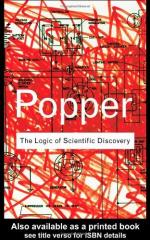|
This section contains 454 words (approx. 2 pages at 400 words per page) |

|
Part II: Chapter 7, Simplicity Summary and Analysis
Many philosophers emphasize the importance of simplicity. Popper claims they do this without recognizing the difficulties that arise by this emphasis. Without further explanation, he finds simplicity as it is normally applied untenable. First he eliminates the pragmatic and aesthetic meaning of simplicity in his application to epistemological questions. Conventional theory holds that simplicity is expected to achieve a law-like regularity of events as it is considered within epistemology. For Popper, this does not hold up under scrutiny.
Simplicity is suspect to Popper because it plays a special role in the theories of inductive logic. It is used in arriving at natural laws by making generalizations from particular observations. Popper cites Wittgenstein, Schlick and Feigel's call for simplicity as a basic law. He believes their approach logically misses crucial points in the argument. This is...
(read more from the Part II: Chapter 7, Simplicity Summary)
|
This section contains 454 words (approx. 2 pages at 400 words per page) |

|




